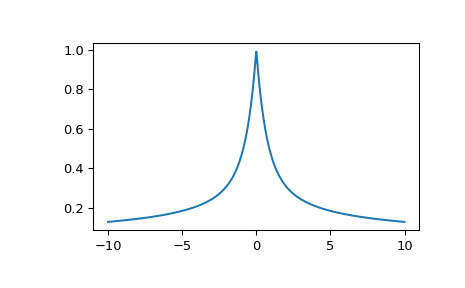scipy.special.i0e#
- scipy.special.i0e(x, out=None) = <ufunc 'i0e'>#
Exponentially scaled modified Bessel function of order 0.
Defined as:
i0e(x) = exp(-abs(x)) * i0(x).
- Parameters:
- xarray_like
Argument (float)
- outndarray, optional
Optional output array for the function values
- Returns:
- Iscalar or ndarray
Value of the exponentially scaled modified Bessel function of order 0 at x.
Notes
The range is partitioned into the two intervals [0, 8] and (8, infinity). Chebyshev polynomial expansions are employed in each interval. The polynomial expansions used are the same as those in
i0, but they are not multiplied by the dominant exponential factor.This function is a wrapper for the Cephes [1] routine
i0e.References
[1]Cephes Mathematical Functions Library, http://www.netlib.org/cephes/
Examples
Calculate the function at one point:
>>> from scipy.special import i0e >>> i0e(1.) 0.46575960759364043
Calculate the function at several points:
>>> import numpy as np >>> i0e(np.array([-2., 0., 3.])) array([0.30850832, 1. , 0.24300035])
Plot the function from -10 to 10.
>>> import matplotlib.pyplot as plt >>> fig, ax = plt.subplots() >>> x = np.linspace(-10., 10., 1000) >>> y = i0e(x) >>> ax.plot(x, y) >>> plt.show()

Exponentially scaled Bessel functions are useful for large arguments for which the unscaled Bessel functions overflow or lose precision. In the following example
i0returns infinity whereasi0estill returns a finite number.>>> from scipy.special import i0 >>> i0(1000.), i0e(1000.) (inf, 0.012617240455891257)